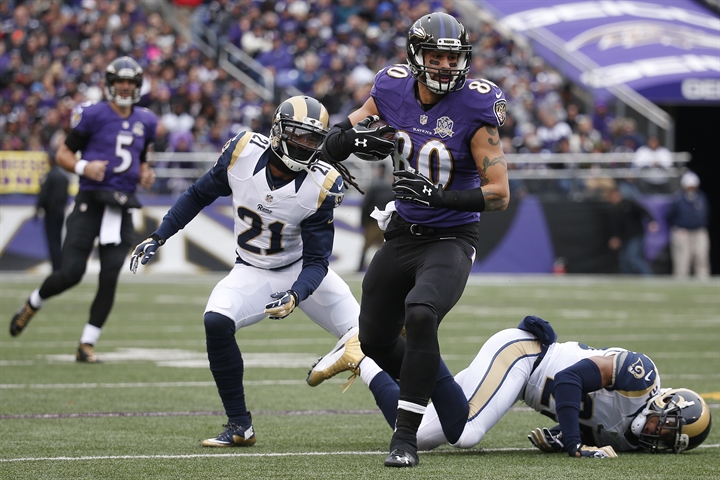When former Baltimore Ravens tight end Crockett Gillmore set out to be a coach, he got denied from all eight middle school jobs he applied for. The search committees saw his NFL credentials and immediately deemed him overqualified.
A resume only describes what the person has done, not why they’re doing it. Gillmore could’ve coached professionally; his heart belonged in the school system.
“From a coach's perspective, the most important group is your young ones, whether that be elementary or middle school,” Gillmore said. “If they don’t have the discipline and work ethic at that age, then they’re not going to gain it all of a sudden in high school.”
Last year, Gillmore was hired as the head coach at the 68-person Valley High School in Turkey, Texas. He wanted this job because the fewer kids forced him to wear more hats. Yes, he coaches the six-man football team. But serving as the PE Teacher for pre-K and up is just as important to him. This is one of the few places in America he can do both.
Gillmore puts elementary schoolers through the same warm-ups his Colorado State teams did under then-head coach Jim McElwain. Last week, after a group of fifth graders finished a track workout, Valley's athletic director asked them how it was. Not harder than Gillmore’s PE class, they responded. Gillmore bets there’s not another group of 60 kids in the country that can all do a push-up like his can.
Standing 6-feet-6 and barely off his playing weight, Gillmore is intimidating to grown men. During the school day, he focuses all that intensity on kids whose heads don’t even reach his waist. You can call him crazy, and maybe sometimes the students do once he’s out of earshot. But they’ll grow up with character because Gillmore laid the foundation in this gym.
Gillmore’s own NFL career is a testament to the impact of youth coaches. His father, Phillip Gillmore, is the Bill Belichick of Little League football in Amarillo. He coached for 30 years and never lost more than one game in a season. Before every season, Phillip would gather the group of parents and give them a simple message: You won’t necessarily like everything I’ll do, but you’ll like winning. Because losing sucks.
Phillip’s style only worked because of the West Texas parents who didn’t buy into what Crockett Gillmore describes as the ‘If you feel like it’ culture. They were wrestlers, cowboys and construction workers who knew blocking and tackling was part of growing up. To them, football and life were not complicated. You ran halfback dive and halfback lead because all 11 of your guys would beat the person lined up facing them - overcoming their own individual battle three and a half yards at a time down the length of the field.
Everyone bought in. Everyone, that is, except a young Crockett Gillmore. Crockett’s crew was the last Phillip coached, and it may or may not have been because Crockett, playing quarterback, would audible from his dad’s play calls and try to throw touchdown passes instead of handing the ball off.

Phillip didn’t see his teaching sink in back then. He never thought Crockett would become a coach. He didn’t even think the NFL was possible until a Colorado State coach called him before Crockett’s senior year and said they worried he would declare for the NFL Draft a year early.
It turned out Crockett was more coachable than his father thought. He’d internalized all those lessons. Now, he’s trying to pass them on to the next kid like himself.
“All these kids grow up at a different speed and different rate,” Phillip said. “You see a kid that’s young, and his talents aren’t what everyone else’s are, but there’s a possibility that that kid could be the one who is in the NFL someday. I think Crockett tries to find that diamond in the rough, where he sees they may not be as tall or big or fast, but they have a great work ethic.”
So here is Crockett Gillmore, turning over every rock and stone inside an elementary school gym in Turkey, Texas, searching for diamonds and then demanding they do push-ups. He knows he’s a throwback coach, that his demanding nature of these kids would draw complaints in most other cities. But all he’s ever needed is one opportunity. He was once the diamond.
“In today’s culture, 99% of the world wouldn’t have taken a shot on me, so I’m grateful for the opportunity,” Gillmore said. “Just like college ball and professional. One team took a chance. From a kid that grew up in West Texas, to having one college offer to where I am today. It’s all been somebody choosing to take a shot on one guy.”
This article is available to our Digital Subscribers.
Click "Subscribe Now" to see a list of subscription offers.
Already a Subscriber? Sign In to access this content.

